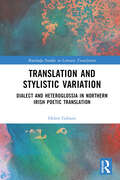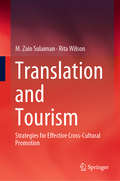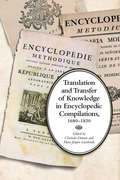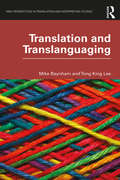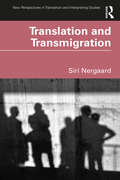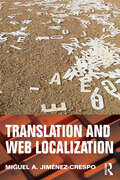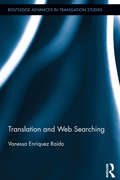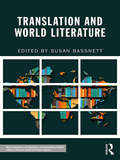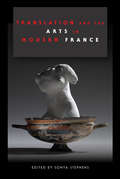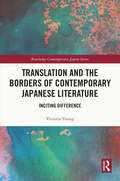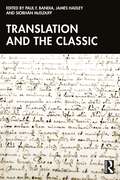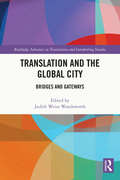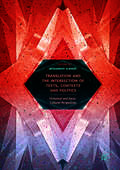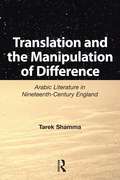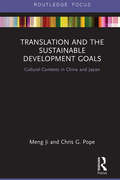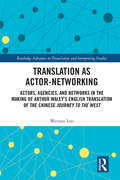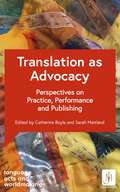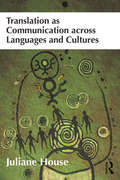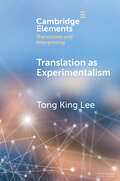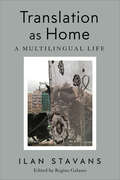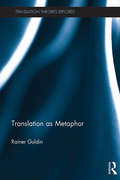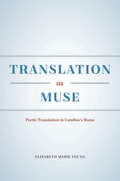- Table View
- List View
Translation and Stylistic Variation: Dialect and Heteroglossia in Northern Irish Poetic Translation (Routledge Studies in Literary Translation)
by Helen GibsonTranslation and Stylistic Variation: Dialect and Heteroglossia in Northern Irish Poetic Translation considers the ways in which translators use stylistic variation, analysing the works of three Northern Irish poet-translators to look at how, in this variety, the translation process becomes a creative act by which translators can explore their own linguistic and cultural heritage. The volume offers a holistic portrait of the use of linguistic variety – dialect and heteroglossia – in the literary translations of Seamus Heaney, Ciaran Carson, and Tom Paulin, shedding light on the translators’ choices but also readers’ experiences of them. Drawing on work from cognitive stylistics, Gibson reflects on how and why translators choose to add linguistic variety and how these choices can often be traced back to their socio-cultural context. The book not only extends existing scholarship on Irish-English literary translation to examine issues unique to Northern Ireland but also raises broader questions about translation in locations where language choice is fraught and political. The volume makes the case for giving increased consideration to the role of the individual translator, both for insights into personal choices and a more nuanced understanding of contemporary literary translation practices, in Ireland and beyond. This book will be of interest to scholars working in translation studies, literary studies and Irish studies.
Translation and Tourism: Strategies for Effective Cross-Cultural Promotion
by Rita Wilson M. Zain SulaimanThis book addresses one of the most central, yet criticised, solutions for international tourism promotion, namely translation. It brings together theory and practice, explores the various challenges involved in translating tourism promotional materials (TPMs), and puts forward a sustainable solution capable of achieving maximum impact in the industry and society.The solution, in the form of a Cultural-Conceptual Translation (CCT) model, identifies effective translation strategies and offers a platform for making TPM translation more streamlined, efficient and easily communicated. Using the English-Malay language combination as a case study, the book analyses tourism discourse and includes a road test of the CCT model on actual end-users of TPMs as well as tourism marketers in the industry. Guidelines for best practices in the industry round out the book, which offers valuable insights not only for researchers but also, and more importantly, various stakeholders in the translation, tourism and advertising industries.
Translation and Transfer of Knowledge in Encyclopedic Compilations, 1680–1830 (UCLA Clark Memorial Library Series)
by Donato And LüsebrinkFrom its modern origins in seventeenth-century France, encyclopedic compilations met the need for the dissemination of information in a more flexible format, one that eschewed the limits of previous centuries of erudition. The rise of vernacular languages dovetailed with the demand for information in every sector, sparking competition among nations to establish the encyclopedic "paper empires" that became symbols of power and potential. The contributors to this edited collection evaluate the long-overlooked phenomenon of knowledge creation and transfer that occurred in hundreds of translated encyclopedic compilations over the long eighteenth century. Analysing multiple instances of translated compilations, Translation and Transfer of Knowledge in Encyclopedic Compilations, 1680–1830 expands into the vast realm of the multilingual, encyclopedic compilation, the most tangible proof of the global enlightenment. Through the presentation of an extensive corpus of translated compilations, this volume argues that the true site of knowledge transfer resided in the transnational movement of ideas exemplified by these compendia. The encyclopedia came to represent the aspiring nation as a viable economic and political player on the world stage; the capability to tell knowledge through culture became the hallmark of a nation’s cultural capital, symbolic of its might and mapping the how, why, and where of the global eighteenth century.
Translation and Translanguaging (New Perspectives in Translation and Interpreting Studies)
by Mike Baynham Tong King LeeTranslation and Translanguaging brings into dialogue translanguaging as a theoretical lens and translation as an applied practice. This book is the first to ask: what can translanguaging tell us about translation and what can translation tell us about translanguaging? Translanguaging originated as a term to characterize bilingual and multilingual repertoires. This book extends the linguistic focus to consider translanguaging and translation in tandem – across languages, language varieties, registers, and discourses, and in a diverse range of contexts: everyday multilingual settings involving community interpreting and cultural brokering, embodied interaction in sports, text-based commodities, and multimodal experimental poetics. Characterizing translanguaging as the deployment of a spectrum of semiotic resources, the book illustrates how perspectives from translation can enrich our understanding of translanguaging, and how translanguaging, with its notions of repertoire and the "moment", can contribute to a practice-based account of translation. Illustrated with examples from a range of languages, including Spanish, Chinese, Japanese, Czech, Lingala, and varieties of English, this timely book will be essential reading for researchers and graduate students in sociolinguistics, translation studies, multimodal studies, applied linguistics, and related areas.
Translation and Transmigration (New Perspectives in Translation and Interpreting Studies)
by Siri NergaardIn our globalized and transcultural world it has become more common than ever to live among different languages, to cross geographical and cultural borders frequently, to negotiate between multiple spaces and loyalties: from global businesspeople to guest workers, from tourists to refugees. In this book, Siri Nergaard examines translation as a personal, intimate experience of a subject living in and among different languages and cultures and sees living in translation as a socio-psychological condition of transmigrancy with strong implications on emotions and behaviour. Adopting a wide transdisciplinary approach, drawing on theories in psychology, anthropology, cultural studies, semiotics, and philosophy, the author investigates the situations of translation affecting individuals, and in particular migrants. With examples from documentaries, photographs, exhibitions, and testimonies, Nergaard also analyses how migrants get translated in political discourse and in official documents, and how they perform their lives as transmigrants. The first part examines in particular three issues and concepts: the figure of the migrant, hospitality, and the border, which are viewed as representing the most fundamental questions of what living in translation means. The second part of the book presents examples of lives in translation through representations in a variety of modes and expressions. This timely book is key reading for researchers and advanced students in translation and interpreting studies, anthropology, migration studies, and related areas.
Translation and Web Localization
by Miguel A. Jimenez-CrespoWeb localization is a cognitive, textual, communicative and technological process by which interactive web texts are modified to be used by audiences in different sociolinguistic contexts. Translation and Web Localization provides an in-depth and comprehensive overview into this emerging field of study. The book covers the key areas and main theoretical and practical approaches of the subject, rather than a step by step practical guide. Topics covered include the often controversial definition of localization, how the process develops, what constitutes a text in this process, digital genre theory and its implications, and how to conduct research or training in this field. The book concludes with a look into the dynamic nature of web localization and the forces, such as crowdsourcing, that are reshaping web localization and translation as we know it. In light of the deep changes brought by the Internet, Translation and Web Localization is an indispensable book for researchers, postgraduate and advanced undergraduate students of translation studies, as well as practitioners and researchers in related fields such as computational linguistics, applied linguistics, Internet linguistics, digital genre theory and web development.
Translation and Web Searching (Routledge Advances in Translation and Interpreting Studies)
by Vanessa Enríquez RaídoThe book presents a comprehensive study of various cognitive and affective aspects of web searching for translation problem solving. Research into the use of the web as an external aid of consultation has frequently occupied a secondary position in the investigation of translation processes. The book aims to bridge this gap in the literature. Beginning with a detailed survey of previous studies of these processes, it then focuses on web search behaviors using qualitative and quantitative analysis that presents a multifaceted overview of translation-oriented web searching. The book concludes by addressing the implications for the teaching of and research into translators’ web searching skills. With regard to teaching, the book's didactic discussions will make it a valuable tool for both translator trainers and translation students wanting to familiarize themselves with the intricacies of Web searching and to reflect upon the pedagogical implications of the study for acquiring online information literacy in translator training.
Translation and World Literature (New Perspectives in Translation and Interpreting Studies)
by Susan BassnettTranslation and World Literature offers a variety of international perspectives on the complex role of translation in the dissemination of literatures around the world. Eleven chapters written by multilingual scholars explore issues and themes as diverse as the geopolitics of translation, cosmopolitanism, changing media environments and transdisciplinarity. This book locates translation firmly within current debates about the transcultural movements of texts and challenges the hegemony of English in world literature. Translation and World Literature is an indispensable resource for students and scholars working in the fields of translation studies, comparative literature and world literature.
Translation and the Arts in Modern France
by Sonya StephensTranslation and the Arts in Modern France sits at the intersection of transposition, translation, and ekphrasis, finding resonances in these areas across periods, places, and forms. Within these contributions, questions of colonization, subjugation, migration, and exile connect Benin to Brittany, and political philosophy to the sentimental novel and to film. Focusing on cultural production from 1830 to the present and privileging French culture, the contributors explore interactions with other cultures, countries, and continents, often explicitly equating intercultural permeability with representational exchange. In doing so, the book exposes the extent to which moving between media and codes—the very process of translation and transposition—is a defining aspect of creativity across time, space, and disciplines.
Translation and the Book Trade in Early Modern Europe
by José María Pérez Fernández Edward Wilson-Lee"This volume provides the first transnational overview of the relationship between translation and the book trade in early modern Europe. Following an introduction to the theories and practices of translation in early modern Europe, and to the role played by translated books in driving and defining the trade in printed books, each chapter focuses on a different aspect of translated-book history - language learning, audience, printing, marketing, and censorship - across several national traditions. This study touches on a wide range of early modern figures who played myriad roles in the book world; many of them also performed these roles in different countries and languages. Topics treated include printers' sensitivity to audience demand; paratextual and typographical techniques for manipulating perception of translated texts; theories of readership that travelled across borders; and the complex interactions between foreign-language teachers, teaching manuals, immigration, diplomacy, and exile"--
Translation and the Borders of Contemporary Japanese Literature: Inciting Difference (Routledge Contemporary Japan Series)
by Victoria YoungThis book examines contemporary debates on such concepts as national literature, world literature, and the relationship each of these to translation, from the perspective of modern Japanese fiction.By reading between the gaps and revealing tensions and blind spots in the image that Japanese literature presents to the world, the author brings together a series of essays and works of fiction that are normally kept separate in distinct subgenres, such as Okinawan literature, zainichi literature written by ethnic Koreans, and other “trans-border” works. The act of translation is reimagined in figurative, expanded, and even disruptive ways with a focus on marginal spaces and trans-border movements. The result decentres the common image of Japanese literature while creating connections to wider questions of multilingualism, decolonisation, historical revisionism, and trauma that are so central to contemporary literary studies.This book will be of interest to all those who study modern Japan and Japanese literature, as well as those working in the wider field of translation studies, as it subjects the concept of world literature to searching analysis.
Translation and the Classic
by Paul F. BandiaThrough a range of accessible and innovative chapters dealing with a spectrum of genres, authors, and periods, this volume seeks to examine the complex relationship between translation and the classic, and how translation makes and remakes (and sometimes invents) classic works for new audiences across space and time.Translation and the Classic is the first volume in a two-volume series examining how classic works fare in translation, how translation is different when it engages with classic texts, and how classic texts can be shaped, understood in new ways, or even created through the process of translation. Although other collections have covered some of this territory, they have done so in partial ways or with a focus on Greek, Roman, and Arabic texts or translations. This collection alone takes the reader from 1000 BCE up to the digital age in a sequence of chapters that encompass areas including philosophy, children’s literature, and pseudotranslation. It asks us to consider translation not just as a mechanism of distribution, but as one of the primary ways that the classic is created and understood by multiple audiences.This book is essential reading for those taking Translation Studies courses at the senior undergraduate and postgraduate level, as well as courses outside Translation Studies such as Comparative Literature and Literary Studies.
Translation and the Global City: Bridges and Gateways (Routledge Advances in Translation and Interpreting Studies)
by Judith Weisz WoodsworthTranslation and the Global City showcases fresh perspectives on translation in a global context, drawing on case studies from Montreal and other multilingual cosmopolitan cities to examine the historical, sociological and cultural factors underpinning the travel of languages, ideas and cultures across borders. Building on the "spatial turn" in translation studies, the book adopts a bridge metaphor to explore the complexities of translational spaces and the ways in which translation acts can both unite and divide in the global city. The collection initiates the discussion with a focus on the Canadian context and specifically the city of Montreal, where historical circumstances, public policy and shifting language politics have led to a burgeoning translation industry. It goes on to address issues of translation in other regions and cities of the world, generating new insights and opening avenues for further research into the relations between languages and cultures. This volume will be of particular interest to students and scholars in translation studies, especially those with an interest in translation theory and the sociology of translation.
Translation and the Intersection of Texts, Contexts and Politics
by Mohammed AlbakryThis book analyzes the impact of historical, political and sociocultural contexts on the reading, rewriting and translating of texts. The authors base their arguments on their experiences of translating or researching different text types, taking in fiction, short stories, memoirs, religious texts, scientific treatises, and news reports from a variety of different languages and cultural traditions. In doing so they cover a wide range of contexts and time periods, including Early Modern Europe, post-1848 Switzerland, nineteenth-century Portugal, Egypt in the early twentieth century under British colonial rule, Spain under Franco's dictatorship, and contemporary Peru and China. They also consider the theoretical and pedagogical implications of their conclusions for translation students and practitioners. This edited collection will be of great interest to scholars working in translation studies, applied linguistics, and on issues of cultural difference.
Translation and the Manipulation of Difference: Arabic Literature in Nineteenth-Century England
by Tarek ShammaTranslation and the Manipulation of Difference explores the question of difference in translation and offers an extended critique of the advocacy of foreignizing translation as a practice that does not minimize the alterity of the foreign text, and could therefore serve as an antidote to ethnocentrism and cultural insularity. Shamma examines the reception of Arabic literature - especially the Arabian Nights - in nineteenth-century England and offers a detailed analysis of the period's major translations from Arabic: by Edward Lane, Richard Burton and Wilfred Blunt. He demonstrates that the long, complicated history of interaction, often confrontation, between Europe and the Arab World, where (mis)representations of the Other were intricately embroiled with political struggles, provides a critical position from which to examine the crucial role of context, above and beyond the textual elements of the translation, in shaping the political effects of translation. Examining translation techniques and decisions in the context of the translators' own goals as well as the conditions that surrounded the reception of their work, the study shows how each translator 'manipulated' his original in line with political positions that ranged from (implicit) acquiescence to steadfast resistance to colonialism. In a carefully elaborated critique of totalizing positions, the author argues that the foreignizing-domesticating model is too limited to describe the social and political function of translation and calls for a more complex understanding of the sociopolitical dimensions of translation strategies.
Translation and the Sustainable Development Goals: Cultural Contexts in China and Japan (Routledge Focus on Public Governance in Asia)
by Meng Ji Chris G. PopeThis book offers insight into the use of empirical diffusionist models for analysis of cross-cultural and cross-national communication, translation and adaptation of the United Nation’s (UN) Sustainable Development Goals (SDGs). The book looks at three social analytical instruments of particular utility for the cross-national study of the translation and diffusion of global sustainable development discourses in East Asia (China and Japan). It explains the underlying hypothesis that, in the transmission and adaptation of global SDGs in different national contexts, three large groups of social actors encompassing sources of information, mediating actors and socio-industrial end-users form, shape and contribute to the complex, latent networks of social engagement. It illuminates how the distribution within these networks largely determines the level and breadth of the diffusion of global SDGs and their associated environmentalist norms. This book is an essential read for anyone interested in sustainable growth and development, as well as global environmental politics.
Translation as Actor-Networking: Actors, Agencies, and Networks in the Making of Arthur Waley’s English Translation of the Chinese 'Journey to the West' (Routledge Advances in Translation and Interpreting Studies)
by Wenyan LuoThis book employs actor-network theory (ANT) to explore the making of the English translation of a work of Chinese canonical fiction, Journey to the West, demonstrating how ANT, as applied to Translation Studies, can contribute to a richer understanding of the translation process. The volume builds on previous research to apply ANT theory to translation studies by looking in-depth at a single work, highlighting the unique factors underpinning the making of Monkey, Arthur Waley’s English translation of the Chinese classic Journey to the West, which make the work an ideal candidate for showing ANT theory in practice in translation. Luo uses an in-depth exploration of the work to examine the ways in which both human and nonhuman translation actors and agents interact in different ways in the publication of this translation, showcasing them as dynamic, changing, and active participants whose roles shifted over the course of the translation process, rather than as fixed entities as traditionally categorized in existing research. The book moves beyond a descriptive account of an ANT-based case study toward offering a systematic theoretical and methodological framework of ANT-based translation studies, using the conclusions drawn from its application to a single work to suggest a way forward for applying ANT in translation production on a wider scale. This book will be of interest to scholars in translation studies, sociology, and comparative literature, particularly those interested in actor-network theory or network studies and their application to related disciplinary fields.
Translation as Advocacy: Perspectives on Practice, Performance and Publishing (Language Acts and Worldmaking)
by VariousWhat does it mean to advocate - in translation, for translation, through translation? What does advocacy look like, for those who do the translating or for those whose work is translated? To what extent is translation itself a form of advocacy? These 'what' questions are the driving force behind this collection.Translation as Advocacy highlights the innovative ways in which translator-academics in seven different fields discuss their practice in relation to their understanding of advocacy. The book aims to encourage people to think about translators as active agents bringing new work into the receiving culture, advocating for the writers they translate, for ideas, for practices. As such, the book asserts that the act of translation is a mode of cultural production and a political intervention through which the translator, as advocate, claims a significant position in intercultural dialogue.Featuring seven interrelated chapters, the book covers themes of judgement, spaces for translation, classroom practice, collaboration, intercultural position, textuality, and voice. Each chapter explores the specific demands of different types of translation work, the specific role of each stage of the process and what advocacy means at each of these stages, for example: choosing what is translated; mediating between author and receiving culture; pitching to publishers; social interactions; framing the translation for different audiences; teaching; creating new canons; gatekeepers and prizes; dissemination; marketing and reception. This book repositions the role of the translator-academic as an activist who uses their knowledge and understanding to bring agency to the complex processes of understanding across time and space. Moving critically through the different stages that the translator-academic occupies, using the spaces for research, performance and classroom teaching as springboards for active engagement with the key preoccupations of our times, this book will highlight translation as advocacy for students, educators, audiences for translation and the translation industry.Like all the volumes in the Language Acts and Worldmaking series, the overall aim is two-fold: to challenge widely-held views about language learning as a neutral instrument of globalisation and to innovate and transform language research, teaching and learning, together with Modern Languages as an academic discipline, by foregrounding its unique form of cognition and critical engagement.Specific aims are to:· propose new ways of bridging the gaps between those who teach and research languages and those who learn and use them in everyday contexts from the professional to the personal· put research into the hands of wider audiences· share a philosophy, policy and practice of language teaching and learning which turns research into action· provide the research, experience and data to enable informed debates on current issues and attitudes in language learning, teaching and research· share knowledge across and within all levels and experiences of language learning and teaching· showcase exciting new work that derives from different types of community activity and is of practical relevance to its audiences· disseminate new research in languages that engages with diverse communities of language practitioners.
Translation as Advocacy: Perspectives on Practice, Performance and Publishing (Language Acts and Worldmaking)
by VariousWhat does it mean to advocate - in translation, for translation, through translation? What does advocacy look like, for those who do the translating or for those whose work is translated? To what extent is translation itself a form of advocacy? These 'what' questions are the driving force behind this collection.Translation as Advocacy highlights the innovative ways in which translator-academics in seven different fields discuss their practice in relation to their understanding of advocacy. The book aims to encourage people to think about translators as active agents bringing new work into the receiving culture, advocating for the writers they translate, for ideas, for practices. As such, the book asserts that the act of translation is a mode of cultural production and a political intervention through which the translator, as advocate, claims a significant position in intercultural dialogue.Featuring seven interrelated chapters, the book covers themes of judgement, spaces for translation, classroom practice, collaboration, intercultural position, textuality, and voice. Each chapter explores the specific demands of different types of translation work, the specific role of each stage of the process and what advocacy means at each of these stages, for example: choosing what is translated; mediating between author and receiving culture; pitching to publishers; social interactions; framing the translation for different audiences; teaching; creating new canons; gatekeepers and prizes; dissemination; marketing and reception. This book repositions the role of the translator-academic as an activist who uses their knowledge and understanding to bring agency to the complex processes of understanding across time and space. Moving critically through the different stages that the translator-academic occupies, using the spaces for research, performance and classroom teaching as springboards for active engagement with the key preoccupations of our times, this book will highlight translation as advocacy for students, educators, audiences for translation and the translation industry.Like all the volumes in the Language Acts and Worldmaking series, the overall aim is two-fold: to challenge widely-held views about language learning as a neutral instrument of globalisation and to innovate and transform language research, teaching and learning, together with Modern Languages as an academic discipline, by foregrounding its unique form of cognition and critical engagement.Specific aims are to:· propose new ways of bridging the gaps between those who teach and research languages and those who learn and use them in everyday contexts from the professional to the personal· put research into the hands of wider audiences· share a philosophy, policy and practice of language teaching and learning which turns research into action· provide the research, experience and data to enable informed debates on current issues and attitudes in language learning, teaching and research· share knowledge across and within all levels and experiences of language learning and teaching· showcase exciting new work that derives from different types of community activity and is of practical relevance to its audiences· disseminate new research in languages that engages with diverse communities of language practitioners.
Translation as Communication across Languages and Cultures
by Juliane HouseIn this interdisciplinary book, Juliane House breaks new ground by situating translation within Applied Linguistics. In thirteen chapters, she examines translation as a means of communication across different languages and cultures, provides a critical overview of different approaches to translation, of the link between culture and translation, and between views of context and text in translation. Featuring an account of translation from a linguistic-cognitive perspective, House covers problematic issues such as the existence of universals of translation, cases of untranslatability and ways and means of assessing the quality of a translation. Recent methodological and research avenues such as the role of corpora in translation and the effects of globalization processes on translation are presented in a neutral, non-biased manner. The book concludes with a thorough, historical account of the role of translation in foreign language learning and teaching and a discussion of new challenges and problems of the professional practice of translation in our world today. Written by a highly experienced teacher and researcher in the field, Translation as Communication across Languages and Cultures is an essential resource for students and researchers of Translation Studies, Applied Linguistics and Communication Studies.
Translation as Experimentalism: Exploring Play in Poetics (Elements in Translation and Interpreting)
by Tong King LeeThis Element argues for a perspective on literary translation based around the idea of ludification, using concrete poetry as a test case. Unlike rational-scientific models of translating, ludic translation downplays the linear transmission of meaning from one language into another. It foregrounds instead the open-ended, ergodic nature of translation, where the translator engages with and responds to an original work in an experimental and experiential manner. Focusing on memes rather than signs, ludic translation challenges us to adopt an oblique lens on literary texts and deploy verbal as well as nonverbal resources to add value to an original work. Such an approach is especially amenable to negotiating apparently untranslatable writing like concrete poems across languages, modes, and media. This Element questions assumptions about translatability and opens the discursive space of literary writing to transgressive articulation and multimodal performance. This title is also available as Open Access on Cambridge Core.
Translation as Home: A Multilingual Life
by Ilan StavansTranslation as Home is a collection of autobiographical essays by Ilan Stavans that eloquently and unequivocally make the case that translation is not only a career, but a way of life. Born in Mexico City, Ilan Stavans is an essayist, anthologist, literary scholar, translator, and editor. Stavans has changed languages at various points in his life: from Yiddish to Spanish to Hebrew and English. A controversial public intellectual, he is the world’s authority on hybrid languages and on the history of dictionaries. His influential studies on Spanglish have redefined many fields of study, and he has become an international authority on translation as a mechanism of survival. This collection deals with Stavans’s three selves: Mexican, Jewish, and American. The volume presents his recent essays, some previously unpublished, addressing the themes of language, identity, and translation and emphasizing his work in Latin American and Jewish studies. It also features conversations between Stavans and writers, educators, and translators, including Regina Galasso, the author of the introduction and editor of the volume.
Translation as Metaphor (Translation Theories Explored)
by Rainer GuldinIn today’s ever-changing climate of disintegration and recombination, translation has become one of the essential metaphors, if not the metaphor, of our globalized world. Translation and Metaphor is an attempt to draw a comprehensive map of these new overlapping theoretical territories and the many cross-disciplinary movements they imply. In five chapters, this book examines: · The main metaphor theories developed in the West. · The way the notion of metaphor relates to the concept of translation. · Different theoretical perspectives on metaphors of translation in translation studies. · The main metaphors developed to describe translation in the West and in the East. · Spatial metaphors within translation studies, cultural studies and postcolonial theory. · The use of the metaphor of translation across psychoanalysis, anthropology and ethnography, postcolonial theory, history and literature, sociology, media and communication theory, and medicine and genetics. Comprehensive analysis of key metaphor theories, revealing examples from a wide range of sources and a look towards future directions make this is a must-have book for students, researchers and translators working in the areas of translation and translation theory.
Translation as Muse: Poetic Translation in Catullus's Rome
by Elizabeth Marie YoungPoetry is often said to resist translation, its integration of form and meaning rendering even the best translations problematic. Elizabeth Marie Young disagrees, and with Translation as Muse, she uses the work of the celebrated Roman poet Catullus to mount a powerful argument that translation can be an engine of poetic invention. Catullus has long been admired as a poet, but his efforts as a translator have been largely ignored. Young reveals how essential translation is to his work: many poems by Catullus that we tend to label as lyric originals were in fact shaped by Roman translation practices entirely different from our own. By rereading Catullus through the lens of translation, Young exposes new layers of ingenuity in Latin poetry even as she illuminates the idiosyncrasies of Roman translation practice, reconfigures our understanding of translation history, and questions basic assumptions about lyric poetry itself.
Translation as Muse: Poetic Translation in Catullus's Rome
by Elizabeth Marie YoungPoetry is often said to resist translation, its integration of form and meaning rendering even the best translations problematic. Elizabeth Marie Young disagrees, and with Translation as Muse, she uses the work of the celebrated Roman poet Catullus to mount a powerful argument that translation can be an engine of poetic invention. Catullus has long been admired as a poet, but his efforts as a translator have been largely ignored. Young reveals how essential translation is to his work: many poems by Catullus that we tend to label as lyric originals were in fact shaped by Roman translation practices entirely different from our own. By rereading Catullus through the lens of translation, Young exposes new layers of ingenuity in Latin poetry even as she illuminates the idiosyncrasies of Roman translation practice, reconfigures our understanding of translation history, and questions basic assumptions about lyric poetry itself.
